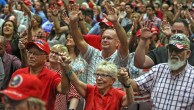30. What are the penalties if a religious organization violates the political campaign intervention prohibition?
Unlike lobbying by a religious organization, which is limited but not prohibited, political campaign intervention by a religious organization is strictly prohibited.59 Thus, the organization’s 501(c)(3) tax exemption may be revoked if it engages in any prohibited activity. This means that the organization’s income for the year would become subject to income tax. An excise tax on political expenditures may also be imposed on the religious organization as well as on the clergy member or other leader who authorized the political expenditures.60 Depending on the circumstances, the excise tax may be imposed in addition to revocation of tax exemption or instead of revocation of tax exemption.61 Generally, if the political expenditure is unintentional, the amount is small and the religious organization institutes operational changes to prevent future political expenditures, the IRS will not seek revocation of tax-exempt status.62
31. Does the IRS target churches for enforcement of the political campaign intervention prohibition?
No. There are special audit procedures that the IRS must follow before commencing any inquiry about potential violation by a church of the political campaign intervention prohibition.63 The IRS may begin a church tax inquiry only if the Director, Exempt Organizations, Examinations, reasonably believes, based on facts and circumstances recorded in writing, that the church may not be qualified for section 501(c)(3) tax exemption, including potential violations of the political campaign intervention prohibition. Once an inquiry is begun, the IRS must follow special procedures set forth in the Internal Revenue Code in its further dealings with the church.64 Thus, the IRS does not have unfettered discretion to investigate activities by churches, including violations of the political campaign intervention prohibition, and must obtain high-level authorization before doing so. Generally, IRS inquiries about potential violations by churches of the political campaign intervention prohibition are initiated based upon facts reported by the media or complaints submitted by third parties.
In anticipation of the 2008 election season, the IRS issued formal guidance to assist organizations exempt from tax under section 501(c)(3) of the Internal Revenue Code in understanding the prohibition against political campaign intervention. This guidance includes 21 examples, each involving a single type of activity and designed to illustrate how facts and circumstances are applied in determining whether a tax-exempt organization has engaged in prohibited political campaign intervention. The IRS cautions that combining more than one type of activity may result in an interaction among such activities that could alter the determination of whether political campaign intervention has occurred. Rev. Rul. 2007-41, 2007-25 I.R.B. 1421 (June 18, 2007).
The IRS website contains a number of helpful resources relating to the prohibition against political campaign intervention for section 501(c)(3) tax-exempt organizations. These include reports on IRS Political Activity Compliance Initiatives for 2004 and 2006, the script of a 2006 IRS phone forum on political campaign intervention, the history of the political campaign intervention prohibition and relevant articles from annual Exempt Organizations Continuing Professional Education Texts. See: Charities, Churches, and Educational Organizations – Political Campaign Intervention, www.irs.gov/charities/charitable/article/0,,id=155030,00.html.
Appendix A: Examples of Impermissible Political Intervention
[a section 501(c)(3) organization]
[a section 501(c)(3) organization]
[Rev. Rel. 2007-41, at 1423 (Situation 9)]
[Rev. Rul. 2007-41, at 1426 (Situation 21)]
Appendix B: Examples of Permissible Political Activity
[a section 501(c)(3) organization]
[a section 501(c)(3) organization]
FOOTNOTES
59The IRS interprets the political activity prohibition as absolute. See Pub. 1828 at 7; Election Year Issues at 352.
60I.R.C. § 4955(a)(1) and (b)(1); Pub. 1828 at 11; Election Year Issues at 353-363. In order to avoid a second-tier excise tax under section 4955, a religious organization must “correct” any political expenditure by recovering the expenditure to the extent possible and by adopting safeguards to ensure against future political expenditures.
61See Preamble, Final Regulations on Political Expenditures by Section 501(c)(3) Organizations, 60 Fed. Reg. 62,209 (Dec. 5, 1995); Election Year Issues at 353-354.
62Election Year Issues at 354.
[a]
